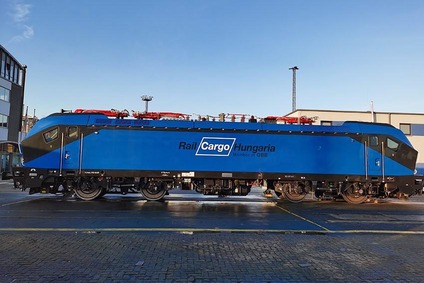
In the upcoming months, experts will check whether the vehicle meets the requirements of the market-leading Hungarian rail freight company, as well as carry out the examinations and running tests required for the licences. This will be the first Chinese locomotive running on the railway network of the European Union to receive a type approval.
After the successful completion of the tests, Rail Cargo Hungaria will be the first in Europe to use economically operated, high-power mainline locomotives and shunters with zero emission in the rail freight sector. The vehicle technology enables that condenser-like units, so called supercapacities ensure the power supply for further transport on lines without overhead wires. Locomotives can charge these energy storage devices, while standing or during transport, from overhead wires, or at charging points.
The e-hybrid locomotive is able to continue its journey even if the power supply of overhead wires is interrupted due to a breakdown or construction. Thanks to this new technology, RCH will not have to replace the electric locomotive by a diesel loc, using expensive railway technology. It will also provide a solution for industrial sidings where overhead wires are usually not available. In these cases shunting is carried out by diesel locomotives, polluting the air of the marshalling yards and private track networks. The hybrid vehicles, ordered by Rail Cargo Hungaria will perform these tasks economically and in a clean way.
This currently tested environmental friendly e-hybrid locomotive is planned to be able to run at least ten kilometres on a horizontal track on its own, without an overhead wire. This solution exceeds the performance required by the international practice for last miles.
Static and dynamic tests of the first vehicle delivered will take place in the technical laboratory of Minden, in North Rhine-Westphalia, running and braking tests will be carried out on the test track of the German Federal Railways. After the tests, expected to be finished by the end of May, the stress tests will be performed on an open railway network.
During the dynamic tests, the locomotive must haul away a train set of 300 tonnes for a distance of at least 500 km and in case of the stress tests, the required mileage comprises 1,570 km. According to plans, the test of the vehicle will take altogether approximately 1,750 operating hours.
The complexity of the work required to obtain the type approval is increased by the fact that while currently there is no technical experience available in the EU in respect of Chinese locomotives; there are no precedents for the interpretation of the requirements of the recently introduced 4th railway package, either.
According to the contract signed in October 2019 between Rail Cargo Hungaria and CRRC ZELC, the Chinese company develops electro-hybrid shunters and high-power mainline locomotives with zero emission optimized for freight transport within 36 months, produces two vehicles of each type and delivers them with the relevant Hungarian and international licences to the Hungarian rail freight company. In accordance with the agreement, RCH is going to lease the vehicles for a period of four years. If the hybrid locomotives meet the expected performance, RCH can exercise an additional lease or even a purchase option, and can order additional 20 vehicles of both types each under favourable terms and conditions.
RCH is going to use the shunters in Hungary and plans to use the mainline locomotives in addition to Hungary in Croatia, Serbia, Romania, Macedonia, Greece and Bulgaria.
In the operation of RCH, innovation and environmental consciousness are mutually reinforcing factors. With its transport capacity, the company makes the operation of tens of thousands of trucks redundant annually, and hence relieving the environment of approximately half a million tonnes of greenhouse gas emissions a year.
